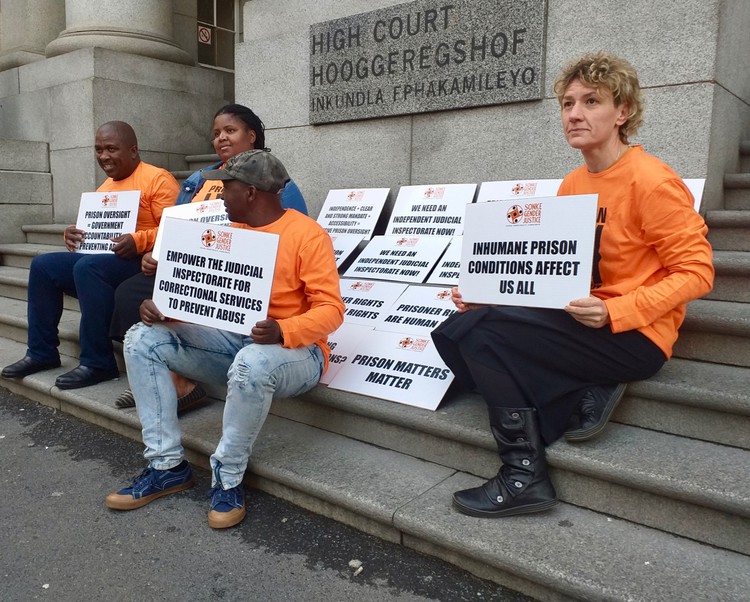Call to bolster independence of prisons watchdog
“A watchdog body which is understaffed and unable to do what it’s meant to do”
The independence of the Judicial Inspectorate of Correctional Services (JICS) is essential to safeguard the rights and safety of prison inmates, Advocate Nazreen Bawa, argued in the Western Cape High Court on Thursday.
The JICS uses independent visitors to monitor correctional facilities, report complaints by inmates, and investigate incidents, under the supervision of an inspecting judge, currently Judge Johann van der Westhuizen.
Sonke Gender Justice and Lawyers for Human Rights, represented by Bawa, want the courts to declare sections of the Correctional Services Act, which regulates the inspectorate, unconstitutional. An application was first filed in December 2016.
The respondents include the President of South Africa, Minister of Justice and Correctional Services, National Commissioner of Correctional Services, Inspecting Judge for Correctional Services, and the ministers of Finance and of Public Service and Administration.
On Thursday, Bawa argued that for the inspectorate to be truly independent, it needed to have sufficient control of its budget; be able to carry out tasks without the assistance or permission of the Department (Justice and Correctional Services); and that it be seen by the public and by inmates as independent.
Bawa said JICS had very little influence over its own financial and human resource needs because its budget was determined and administered by the Department.
“All of this impacts the response the inspectorate has towards transgressions or complaints against correctional services. It’s a watchdog body which is understaffed and unable to do what it’s meant to do. You can see this in the number of assaults that are not investigated and a less than 1% conviction rate,” said Bawa.
Advocate Rajesh Choudree, for the President, told the court that the matter had been “coming on a long time” and advised that the matter be adjourned while discussions between JICS and the state are concluded.
Advocate Marumo Moerane, for the minister of Justice and Correctional Services, argued at length that the Act’s provisions ensured JICS’s independence from both the Department and Commissioner. He said JICS was “controlled by the inspecting judge who is an independent person”.
Moerane argued that “there is nothing wrong with those sections [of the Act]” and that they should not be set aside as unconstitutional.
Moerane told the court that most of the concerns raised by the applicants were being dealt with during their ongoing discussions with JICS. “Measures are afoot and the intention is to have JICS control its own budgets and that is what is proposed in the business plan. Every effort is being made for JICS to have its own ringfenced, earmarked funds from the national fiscus,” he said.
Advocate Karrisha Pillay, for JICS, conceded that there were administrative and financial “difficulties” at the inspectorate.
In response to the suggestion that proceedings be halted until the parties made progress in discussions, Bawa said, “The complaint before this court is of the constitutional invalidity of provisions in the Act which cannot be cured by a business case [the discussions].”
Bawa said the Act did not provide “sufficient independence” required by the inspectorate. Should their application be successful, Bawa suggested that the court suspend the order for 18 months, giving Parliament enough time to fix the legislation.
Judge Nolwazi Boqwana reserved her ruling on the matter.
Before the hearing, over a dozen activists from Sonke and other organisations picketed on the steps to the court.
Marlise Richter, head of policy and advocacy at Sonke Gender Justice, said it mostly received complaints from inmates over gender-based violence and inadequate services.
“The current conditions within prisons make inmates more vulnerable to HIV, TB and sexual violence. Even though JICS can lay complaints, their recommendations are not binding. We want JICS to have more power so its recommendations are listened to,” she said.
Richter gave as an example of a recent case brought against overcrowding at Pollsmoor Remand Detention Facility, which has consistently had over 150% occupancy.
“In December the high court ordered the Department to ensure that inmates should be less than 150% capacity. Since then, there’s only been four months where Pollsmoor Remand was under 150%,” she said.
“In the latest stats from March 2019, they were at 190% capacity. Having an independent body that can help put pressure on the Department and government to ensure that there is humane conditions in prisons is vital,” she said.
Next: Herding cattle in Gauteng to send every cent possible to Lesotho
Previous: Community clean up turns waste into arts and crafts
© 2019 GroundUp.
This article is licensed under a Creative Commons Attribution-NoDerivatives 4.0 International License.
You may republish this article, so long as you credit the authors and GroundUp, and do not change the text. Please include a link back to the original article.



